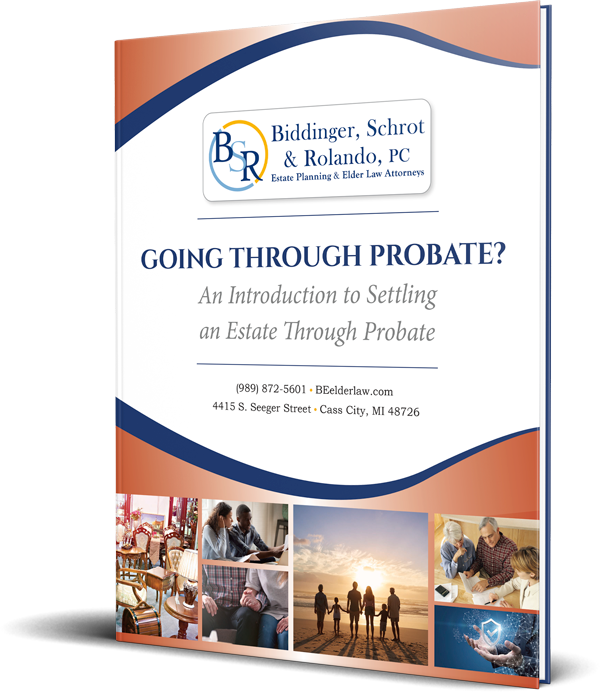Probate Avoidance
Probate Attorneys in the Thumb of Michigan

Schedule a Confidential Consultation
Detailed Contact Form
"*" indicates required fields
When a Person Passes Away Without a Will
—or even with a will— that person’s estate must go through probate. The probate process is often time-consuming, frustrating, and expensive. It is made all the more difficult by the grief that accompanies the loss of a loved one. Many people choose to have an attorney create a plan that allows their estate, and their loved ones, to avoid probate. At Biddinger, Schrot & Rolando, PC, we have helped numerous Michiganders accomplish this goal.
The Benefits of Avoiding Probate:
Avoiding probate not only simplifies distributions but also yields numerous benefits. These advantages include reducing financial burdens by avoiding court and legal fees and initiating asset distribution promptly. Furthermore, it safeguards the privacy of sensitive estate details and serves as a defense against Medicaid Estate Recovery. Let's take a deeper look into these aspects.
Reduce Expenses:
There are court fees, legal fees, and other expenditures associated with probate. By avoiding probate, the money saved is available to heirs.
Expedite the Distribution of Estate Assets:
Most probates in Michigan take between seven months and one year. Complicated estates and family disputes can make probate last even longer. Assets cannot be distributed to heirs during probate, which can make it difficult for surviving family members to pay mortgages, make car payments, pay for insurance, and more.
Protect Privacy:
Probate is a public process. Anyone, including potential predators, can gain access to information about the decedent’s debts, creditors, assets, and other sensitive matters.
Avoid Estate Recovery:
If Medicaid pays for the nursing home care (or other medical care) of a person 55 or older, the state can make a claim on the person’s assets after death. However, if assets had been transferred to a trust before the person passed away, there would be no assets in the decedent’s estate available for recovery. Therefore, using a trust to avoid probate also protects against estate recovery.
How to Avoid Probate:
To effectively avoid probate, we have a range of tools and strategies that can be used. One common method involves establishing a trust, which can be either revocable or irrevocable. Revocable trusts, also known as living trusts, allow individuals to retain control over their assets during their lifetime while specifying how those assets should be distributed upon their death. By transferring assets into a revocable trust, they can bypass probate entirely, ensuring a smoother transition for their beneficiaries. On the other hand, irrevocable trusts (commonly known as a Farm Trust, Medicaid Protection Trust, or Family Trust) permanently transfer assets out of the individual's ownership, providing additional asset protection and potential tax benefits, while still avoiding probate.
Another effective approach is to utilize beneficiary designations on accounts such as pay-on-death (POD) or transfer-on-death (TOD) accounts. By designating beneficiaries for these accounts, the assets held within them can transfer directly to the named beneficiaries upon the individual's death, bypassing probate entirely. This streamlined process ensures that the assets are quickly and efficiently distributed to the intended recipients.
Furthermore, joint ownership with rights of survivorship can be utilized to avoid probate. In this arrangement, assets such as real estate or bank accounts are jointly owned by two or more individuals, and upon the death of one owner, the ownership automatically transfers to the surviving owner(s) without the need for probate.
For those primarily concerned with transferring real estate, a lady bird deed offers an alternative solution. This unique deed allows individuals to retain control and ownership of their property during their lifetime while specifying a beneficiary to inherit the property upon their death. Similar to other probate avoidance methods, a lady bird deed facilitates the transfer of real property outside of probate, offering greater flexibility and control over the distribution of assets.
By utilizing these various tools and strategies in estate planning, individuals can effectively avoid probate and ensure a seamless transfer of assets to their intended beneficiaries. To learn more about how to avoid probate, and the many benefits of estate planning in general, contact us for a consultation to discuss your particular needs and goals.
Attend A Workshop
There are no upcoming events at this time


